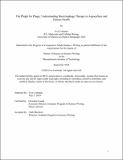| dc.contributor.advisor | Couch, Christina | |
| dc.contributor.author | Cornman, Eva | |
| dc.date.accessioned | 2024-10-02T17:30:08Z | |
| dc.date.available | 2024-10-02T17:30:08Z | |
| dc.date.issued | 2024-09 | |
| dc.date.submitted | 2024-08-08T17:09:44.236Z | |
| dc.identifier.uri | https://hdl.handle.net/1721.1/157095 | |
| dc.description.abstract | In the wake of the antibiotic resistance crisis, alternative options to prevent and treat bacterial infections are desperately needed. Researchers across the world are turning to the most abundant
biological particle on our planet: bacteriophage. Often called phage, these microscopic viruses infect bacteria, and their high specificity and incredible abundance may make them viable treatment options. Scientists have known about phage for over a century, but renewed interest over the past few decades has spurred a wide variety of research into the biology and applications of these viruses. The benefits, and some of the challenges, of phage therapy for both
aquaculture and human health are discussed here. | |
| dc.publisher | Massachusetts Institute of Technology | |
| dc.rights | In Copyright - Educational Use Permitted | |
| dc.rights | Copyright retained by author(s) | |
| dc.rights.uri | https://rightsstatements.org/page/InC-EDU/1.0/ | |
| dc.title | The Phight for Phage: Understanding Bacteriophage Therapy in Aquaculture and Human Health | |
| dc.type | Thesis | |
| dc.description.degree | S.M. | |
| dc.contributor.department | Massachusetts Institute of Technology. Program in Comparative Media Studies/Writing | |
| dc.contributor.department | Massachusetts Institute of Technology. Graduate Program in Science Writing | |
| mit.thesis.degree | Master | |
| thesis.degree.name | Master of Science in Science Writing | |
